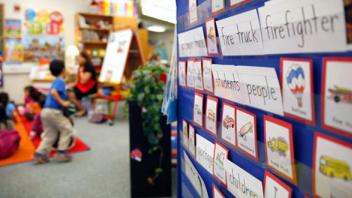I often hear concerns about our students’ poor spelling abilities, and have been thinking about practical ways to address this issue. Although we want to continue to steer away from memorized lists that are often not retained, I want to get your feedback about incorporating more word study in your ELA block. I know what you are thinking — there is no time! I first want to hear your concerns about spelling, so we can determine a manageable way to address them.
My word study involves challenging vocabulary from my student’s self-selected books and Greek and Latin word study. I agree my students have poor spelling abilities but I try and address this issue incidentally through my Writer’s Workshop. What are your thoughts on Spelling instruction at a 5th grade level?
This letter raises an interesting issue, and one I don’t hear much about anymore. At one time, spelling was a big focus in the English Language Arts, and reviews of the research on spelling go back to 1919 (Ernest Horn’s classic, that sketched out a vision of the study results that would be fresh even today).
This letter does a good job of laying out the current beliefs of many (that formal spelling instruction doesn’t work), the concern (that students don’t spell well), a barrier to action (the amount of time available for instruction), and a stab at a solution (editing student writing during Writer’s Workshop).
Last year, Steve Graham and Tanya Santangelo published an excellent meta-analysis of 53 studies conducted with more than 6000 kids, grades K-12. They found, much as Horn did 96 years ago, that explicit instruction improves spelling. Teachers have long had concerns about the impact of teaching kids words and spelling patterns and the like, but the research has been consistent and clear: such teaching helps students to read and write better, and the gains that they make in spelling from such instruction is maintained over time.
The premise that this letter is written on — the idea that memorizing words is bad and that such spelling improvement is not maintained — is simply not true, at any grade. Although young children appear to be able to make some gains in spelling without formal instruction, this is not true with older students; they only tend to improve much as a result of teaching and formal study.
Spelling instruction improves spelling, but it also improves reading ability (and my research from the early 1980s found a clear connection between spelling and word reading and writing for fifth-graders). The impact of instruction on spelling is moderate-to-large, and students who receive explicit spelling instruction not only out-spell those kids who don’t get such teaching, but they do better than those who deal with spelling incidentally through their writing activity in their classrooms.
I would argue for the study of the spelling of words, including those not selected by the kids, but selected because of the challenge or the principles of spelling that they represent. So, spelling lists can have a place in your classroom. I would also argue for the kinds of word study activities and sorting procedures promoted by Don Bear and his colleagues. We want kids to learn to spell particular words and we want them to understand how spelling works.
Spelling is important for a lot of reasons:
- It is included in your educational standards: your community wants kids to spell well.
- Spelling is related to reading. If your students can spell well, they will read better. Spelling involves both an understanding of how letters and sounds relate, but it also entails an understanding of the meaningful parts of words (think of the differences in pronunciation of the spelling of words like: democracy and Democrat; declaration and declare; or cats and dogs; our spelling system preserves the meaning not the sound-symbol relationship).
- Spelling is related to writing. Students, when they can spell well, are more willing to use a wide vocabulary (they aren’t constrained by fear of misspelling) and they can devote their cognitive resources to formulating and communicating their ideas, rather than worrying about how to construct words.
- Spelling problems may draw negative social judgments. Think of Dan Quayle and what people decided about him when he couldn’t spell potato. We also know that writing quality is more likely to be judged negatively by teachers and evaluators when the writing contains misspellings.
- Although spell check helps to even the playing field, it won’t solve the problem entirely. If your spelling skills aren’t advanced enough the computer won’t be able to figure out what it is that you are trying to write, and many times a computer mis-corrects such words.
Yes, I would teach spelling and I would invest in professional development and instructional materials that would support my teachers teaching spelling.
How do you make spelling fit the schedule? That’s a bit more complicated and I’ll deal with that in my next blog post. But until then, indeed, spelling instruction should have a place in your classroom.
About the Author
Literacy expert Timothy Shanahan shares best practices for teaching reading and writing. Dr. Shanahan is an internationally recognized professor of urban education and reading researcher who has extensive experience with children in inner-city schools and children with special needs. All posts are reprinted with permission from Shanahan on Literacy .

